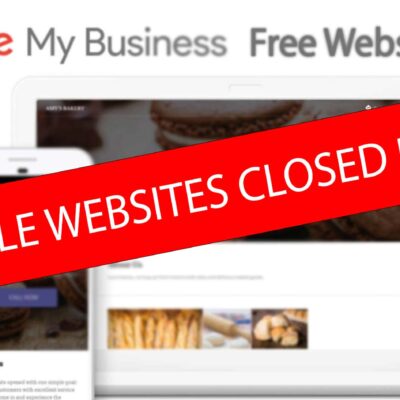
What is a successful website?
A fantastic website to showcase your products, services and achievements is essential, but to be a successful website, it takes more than just good looks!
Whatever the type of website, there will usually be a number of variables involved that provide a “picture of health” – including individual opinions. While one person’s measure of a “successful website” may be very different from the next, there are some fairly consistent standards that exist.
Many businesses and organisations will look at metrics such as traffic results, sign ups or referral volumes as indicators as to whether their website is performing well or not – and then translate that analysis to a level of success. Where eCommerce online shops are concerned, ‘number of sales’ and profits are typically evaluated.
So whether you are new to the world of creating an online presence, or you’re looking to improve what you already have, where do you start when determining whether you have a successful website? What can you do to improve things if you decide that you don’t, and how can you build on things if you do.
Evidently, there’s a number of factors to consider – some more complex than others. Being in the business of creating successful websites and helping businesses maximise their online presence, I felt it was time to write an article on how to get the most from the experience.
In this article, I will cover the basic first steps when starting the journey. In a future article, I will discuss further steps that can be taken to optimise, tweak and improve existing websites.
Do I really need a website?
It wasn’t long ago that media commentators believed Social Media platforms would negate the need for a website! Many businesses invested heavily in their Facebook, Twitter, Linked In and other Social profiles, some at the expense of their own websites. However, it’s clear today, as it was then, that businesses needs both.
Customers prefer to visit a website to find out more about a business or organisation’s products and services, background and capabilities, prior to making a buying decision. Customers clearly also like to see the recent activity of a business on their Social pages for this provides a sense of confidence that they are active and engaged.
Therefore, while Social Media should be used to complement and “keep alive” your brand’s products, services, events, announcements and other general news – it should be used to drive traffic to your website – not the other way around. In essence, if you want a successful business, you need a successful website!
Your website is your shop window and as a business operating in a competitive world, it’s more important than ever to have an excellent, professional, functional and easy to find website – with integrated Social Media to back it up. Nevertheless, there is not a “on size fits all” recipe for a successful website – it depends on your business and several choices you make.
Should I use a professional webdesign company, or build a website myself?
This is a question that often comes up in conversations. Ultimately, only you can decide this, but here is what you should think about when considering who will build your successful website;
- Do you have the skills, knowledge and time to do it yourself – and to do a great job? What happens if you get stuck? Do you know all the intricacies of SEO? How will you measure your own success?
- If you use a friend or family member, what will happen if things don’t get done on time, or it’s not to your standard, or the site just doesn’t perform well?
- What advantage is there in using a professional company? Generally, a professional company will be able to assist you with a wide range of aspects that you may also need to consider, such as specific timeframes, any advanced functionality, web hosting, ongoing maintenance and support, email set up, domain registration, DNS settings and other technical aspects – including of course – how to get the best Search Engine results.
What’s the best way to work with a web designer?
Choose your prospective designer / developer / agency carefully – they are not all equal (either in cost or quality!)
I would suggest you treat your research as you would with any other purchase. Start by preparing a brief that specifies what you are seeking, then request quotes. Look at the prospective designer’s portfolio to see if you like what they’ve done, check their references or testimonials and then send them an enquiry to see how fast they respond to your initial contact. These can be good indications of what you can expect and to see how committed they are. Ensure you compare any pricing between providers fairly – are you comparing apples with apples? Talk to them on the phone (or meet face to face) to check you are dealing with a real person who has the skills you need and who understands your requirements correctly. And yes, personality does matter, as well as professionalism. You’ll want to find someone with artistic, creative flair, who is easy to work with and who knows the technical details inside out.
Once you’ve selected the appropriate designer or agency, check the contract or schedule to ensure you are happy. When the project begins, ensure you communicate openly and provide all the materials required so that they can do their job. If something isn’t working for you during the project, ensure you give them plenty of opportunity to correct it and don’t be shy about offering suggestions.
Employing a professional person or agency for a fair wage to assist you in getting your online business looking and working right should be a rewarding experience for both parties. And if you’ve selected well, you’ll ideally work with them for some time to come.
What platform should I choose for my website?
These days, there are a myriad of software platforms to choose from. Which one you select to build your successful website will depend largely on the specific functionality you need, your budget and other preferences such as Open Source or any previous experience you may have with a particular CMS. If you don’t really know, or don’t really care – you can ask a professional for a recommendation, based on your needs.
A popular Content Management System platform is WordPress which comes in two flavours – a self hosted version and a packaged “off the shelf” version. Generally, we tend to recommend the former as it has much more power and can grow with your needs, be modified to suit virtually an requirement and is completely portable. However, it also requires more knowledge and time to set up, which usually translates to cost.
There are also a lot of “off the shelf pay-per-month” type solutions such as shopify or squarespace. These solutions might appear to be good for small businesses or startups, however, since you will always have a lot less control when using these platforms, you need to be careful how you proceed before you get “locked in”. You don’t want to invest your time and money into something that can’t be easily moved, changed or optimised if you need to grow and expand. On top of that, since you won’t “own” the site, you could find yourself having to start again if anything disagreeable happens on their proprietary platform (for example their privacy policy or pricing model changes – which generally does tend to happen frequently). By having a self-hosted site, you will have total control and will be free to do what ever you want, when you want and how you want.
What are the ingredients for a successful website?
Depending on your opinion of what “success” looks like; in a nutshell here is a short list for consideration;
- Your website should be built using modern software, that can easily be upgraded and modified to suit your needs.
- It should be designed to be easy to use, contain up-to-date information and copy that’s relevant to the products / services you offer.
- Information should be laid out so that it is easy to find with essential content on the front page, or just one click away.
- Navigation should be clear, headings and pages should contain the proper title tags.
- Use of correctly sized and related images are important as are all image tags are populated.
- The site must be built to be mobile friendly, with a fast load time and without errors.
- All code should be validated, clean and minimal.
It is said that you have between 1 and 3 seconds to engage the visitor, so your site has to be attractive and easy to navigate with useful information. While this maybe true with a human visitor, it’s a bit more complex with Search Engines. In order to rank well on search engines, Search Engine Optimisation is not really rocket science, however there are some golden rules that, if not followed, can cause problems down the track. If you employ a professional, they will be able to assist you with the SEO and other complexities to ensure your site ranks well. For example, in our site-builds, we ensure that around 50 different checks are made before going live.
Perhaps most important of all, the content should be interesting and updated regularly to address popular questions that users are likely to ask in searches. Content keywords are important and it also goes without saying that your site must be mobile friendly, load fast and not contain harmful scripts. Purple Dog offers an SEO evaluation service if you already have a website and would like to get a report done. Just get in touch.
Should I use Pop Ups in my website?
A lot of websites seem to employ these kind of strategies. It’s up to you how hard you “push” your visitors and how aggressive you are in your marketing. Research indicates that many users are immediately ‘put off’ by ubiquitous pop ups, so think of your customers’ experience carefully before you use these methods. With that said, if you have something specific you need to communicate to your audience – for example a special offer or a notice that certain content is protected for subscribers only, then typically a banner advert of some kind could work well, without being too “in your face”. You could also consider a small pop-up in the margin of the site, if desired. Otherwise, if you don’t mind annoying your visitors, there are a multitude of pop ups you can use.
Some sites choose to use a Live Chat facility which can be a great way to engage with your visitor immediately. Done well, it can certainly enhance your customer service, but there is also the potential for abuse – so it needs careful consideration.
What should a professional website cost?
This is another great question and can be summarised thus: it depends how complex your needs are. If you just need a simple “brochure” site, the costs could be very low – you might even think to DIY. However, if you get sidetracked or get stuck with a site build, the costs and time commitments can escalate. You could also find a web developer who will charge next to nothing, but will you be satisfied? Equally, you can easily find agencies that will happily charge you tens of thousands.
In most cases, the clients’ we work with all have a similar need statement: they all want a good job done for a fair price. What is a fair price? That largely depends on the amount of time it will take to complete the project, and the skill level of the person or company you decide to work with. It will be more expensive than doing it yourself, or asking your daughter to do it for you, but in reality, you do get what you pay for.
What should I do once my website is launched?
Many businesses, especially those that are small, will simply “stop” once they have the site built – perhaps going as far as to make an announcement about their new website on their Facebook page. This is a mistake and often occurs because they either a) run out of budget b) think the job is done c) get busy with other matters d) or something else. Bear in mind that a brand new website will not rank on search engines immediately and can often take some time to be properly indexed across the web. An existing site that has been redesigned will need careful behind the scenes work as well.
Your website will obviously be designed with the aim of bringing new customers in through SEO, but the truth is, a launched website is really just the beginning. To maximise the benefits, you should plan to invest in additional marketing. If you’re a new business, you should especially consider a paid online advertising programme. A range of other marketing or re-marketing strategies should be considered These can be anything from traditional print advertising, word of mouth, through social media, via other paid promotions – or most beneficially – through a combination of all these methods. Once again, a professional can advise you in these matters.
Also think about how to encourage existing, loyal customers to keep coming back again. This can be in the form of regular news articles or incentives to make a re-purchase, a subscription, to leave feedback, or to find event information or something similar. Encouraging repeat visitors can be challenging – and even more so if your site content is of a static nature, or your products, services or events don’t really change much. Here are some additional ideas:
- Ensure you link the site to your social networks to maximise cross marketing
- Always refer customers back to your website – not your social media channels
- Aim to write a news or blog article at least once per quarter or more frequently if possible.
- Perform regular search engine checks to make sure your site is discoverable
- Make sure your site has been registered with the appropriate search engines and web tools
- Write a newsletter once a month or more
- Get your customers involved by considering additional non-core activities, such as charity or fundraising efforts
- Consider writing relevant articles for other publications (especially popular ones!) and create back or cross-linking
- Think about how adding videos could assist your business
- Run promotions and competitions (more relevant to retail type sites)
- Think about advertising with Adwords or other platforms – depending on your customer profile
- Keep you site up to date – both from a content perspective, but also from a software point of view so that you don’t get hacked.
What ongoing maintenance do I need for my website?

Every day all around the world, websites get hacked. Often, the high profile sites are mentioned in the news – causing embarrassment, cost and trouble for the site owners/administrators – and concern from the site users who may choose to go elsewhere. But what of the many thousands of sites that don’t get reported?
Typically hacking occurs where outdated software or vulnerable code exists – or where weak passwords have been used. Hackers are not always kids in a dark room! These days, sophisticated programs or “bot scripts” are used. These programs are written to scour websites for weaknesses, and where one is found, it’s exploited to the maximum advantage of the hacker – and at the maximum cost and inconvenience to the hacked site owner. Therefore it’s very important to ensure that you have not only strong passwords, but some kind of maintenance agreement in place to assist you in keeping up with site and code security.
Purple Dog offers a maintenance package called Club Purple which offers more than just software updates. We also monitor your site for unusual activity and proactively keep tabs on what’s happening. While no system is fool-proof, it’s a great way to stay ahead of the game. You also get detailed monthly reports on activity. Find out more here.
Where can I get website help & advice
I am happy to have a conversation if you need any help, guidance or advice. Just get in touch.








